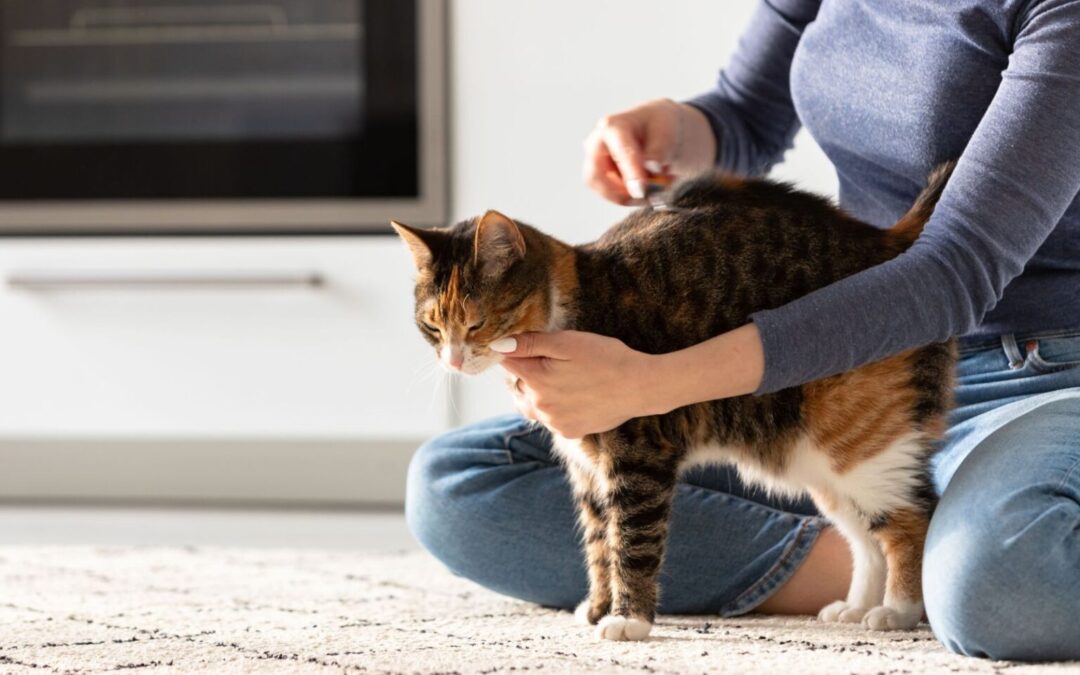Do I need to bathe my cat? What should I feed my kitten? My cat is scratching the mirror…is that normal?
Whether you’re living with a new kitten or have shared your home with cats for years, cat behavior can raise a lot of questions. At Continental Animal Wellness Center in Flagstaff, Arizona, we’ve heard them all and are always happy to share our answers:
- Do you need to bathe your cat: Maybe!
- What should I feed my kitten: Quality kitten food.
- Is that…normal? As normal as a cat can be.
This article addresses common questions, such as those above, about cat diets, health, fitness, and grooming. Keep reading for detailed answers to questions about DIY home pet care for cats to keep them happy, healthy, and safe.
Feline Health and Fitness
When you adopt a kitten, it’s hard to imagine that tiny bundle of energy turning into a lazy loafer. However, many cats without opportunities to exercise will do just that. So how do you give your cat a workout? It’s simple: play with them!
In the wild, cats exercise every day while hunting their meals. Creating opportunities for your pet cat to practice her hunting instincts is all you need to give your cat a workout. Buy cat toys of various sizes and textures so she can exercise her instincts to stalk, chase, pluck, and rake her “prey.” Wand toys, laser pointers, and small toy balls can all get your cat moving and keep her activity levels healthy.
Cat training also contributes to your cat’s overall well-being. While most new puppy parents expect to engage in training, some new cat parents are unsure how to train a kitten. Cats are just as trainable as dogs, though they require a different approach. You might be surprised by all the tricks your cat is capable of!
Finally, take a look around your house and try to see it from your cat’s perspective. Is your home set up to allow your cat to eat, explore, and use the bathroom safely and comfortably?
- Cats are not pack animals, and most will feel most comfortable eating away from other pets. If you have dogs in the house, in particular, try to provide your cat a safe place to eat, either in a separate room from the dogs or in an elevated position.
- Scratching and climbing are instinctive behaviors in cats. Cat condos, climbing toys, and scratching posts provide enrichment for indoor cats and give them an outlet for these feline instincts.
- To minimize the potential for soiling or territorial behavior, you should always have one more litter box than you have cats. If you have one cat, your home should have two litter boxes; for two cats, you should have three litter boxes, etc.
DIY Cat Grooming
Cats are most comfortable in familiar places, so car rides and trips to the groomer can be stressful. Luckily, you can complete most cat grooming from the comfort of home.
Bathing your cat
Cats are fastidious groomers and do a good job keeping their skin and coat clean. Some cat breeds don’t require regular baths, but hairless and some long-haired breeds need regular bathing. Senior cats and those with skin conditions may also need targeted cleaning. Your vet will help you determine your cat’s needs and the best schedule and methods for bathing her.
Cleaning your cat’s ears
If your cat recently had ear mites, an infection, or another medical issue, your vet may prescribe an at-home ear cleaning regimen and solution. Your cat’s condition will determine the frequency and method of cleaning, which your vet will discuss with you. Cats with otherwise healthy ears do not need at-home ear cleaning.
Brushing your cat’s teeth
Many cat parents are surprised to learn they should be brushing their cat’s teeth daily to prevent periodontal disease. It’s best to acclimate a cat to tooth brushing when they’re kittens, but even older cats can get used to the process detailed below.
- Lay your cat on a flat surface on her side, or hold her in your lap.
- Gently pull back your cat’s lips.
- Using a toothbrush and paste designed and approved for cats, concentrate brushing on the canine teeth and large cheek teeth until your cat accepts the activity.
- Once your cat tolerates toothbrushing, begin including all her teeth, brushing for approximately thirty seconds on each side.
Clipping your cat’s nails
Indoor cats need regular nail trimming to keep their nails comfortable and conditioned. Most cats benefit from monthly nail trimming, though your vet can help you identify the ideal schedule for your cat. If you’re new to trimming cats’ nails, ask your vet if they recommend specific tools and to show you how to hold and safely trim your cat’s nails before you try it at home.
DIY Cat Diets Treats and Food
Veterinarians typically endorse cat diets that favor canned or moist food over dry food, though a mix of canned and dry food may be appropriate if suggested by your vet. Your cat also needs access to fresh, clean water at all times. Home-cooked cat diets, raw food diets, grain-free diets, and other niche feeding approaches touted by internet “experts” are rarely recommended or endorsed by vets. Unfortunately, many well-meaning pet owners unknowingly cause harm by feeding their pets homemade diets from unknown or untested sources.
Good quality cat food is vital to your cat’s health. Cats are carnivores and evolved to get their daily nutrients from animal products. A cat’s prey is dissimilar from many of the animal products consumed by humans, however. Quality cat food, formulated to fulfill cat’s unique nutritional requirements, combines precise amounts of protein, vitamins, minerals, and fatty and amino acids.
Healthy cat food is also optimized for each feline life stage. Kitten food formulas contain higher amounts of protein and specific vitamins, minerals, and amino acids, which are necessary during the first year of life. Food formulated for adult cats, senior cats, pregnant and lactating cats, and cats with health conditions meet cats’ unique daily needs at other life stages.
Food allergies are the third most common allergies among cats, and some of the most common cat allergies are beef, lamb, and soy. Before you make any changes to your pet’s diet, you should always discuss it with your veterinarian. They can also help you choose healthy cat treats and snacks for your cat for supplementary feedings or training rewards.
Conclusion
While many cats get used to being groomed and will tolerate if not enjoy some grooming activities, others are less agreeable. If your at-home cat grooming attempts have failed and you’re ready to bring in a professional groomer, don’t search “cat grooming near me” just yet. First, talk to your vet and ask if they can recommend someone. Similarly, your vet should be your first (and, usually, only) source for questions about your cat’s diet, fitness, and overall health.
At Continental Animal Wellness Center in Flagstaff, Arizona, we provide comprehensive and compassionate care focused on your cat’s overall health and wellness. Our state-of-the-art facility is equipped for complete care, including routine wellness visits and vaccinations, sick visits, diagnostics, and surgery. Contact us today to schedule a visit with one of our experienced vets for your cat or kitten and ask about having your pet microchipped.

